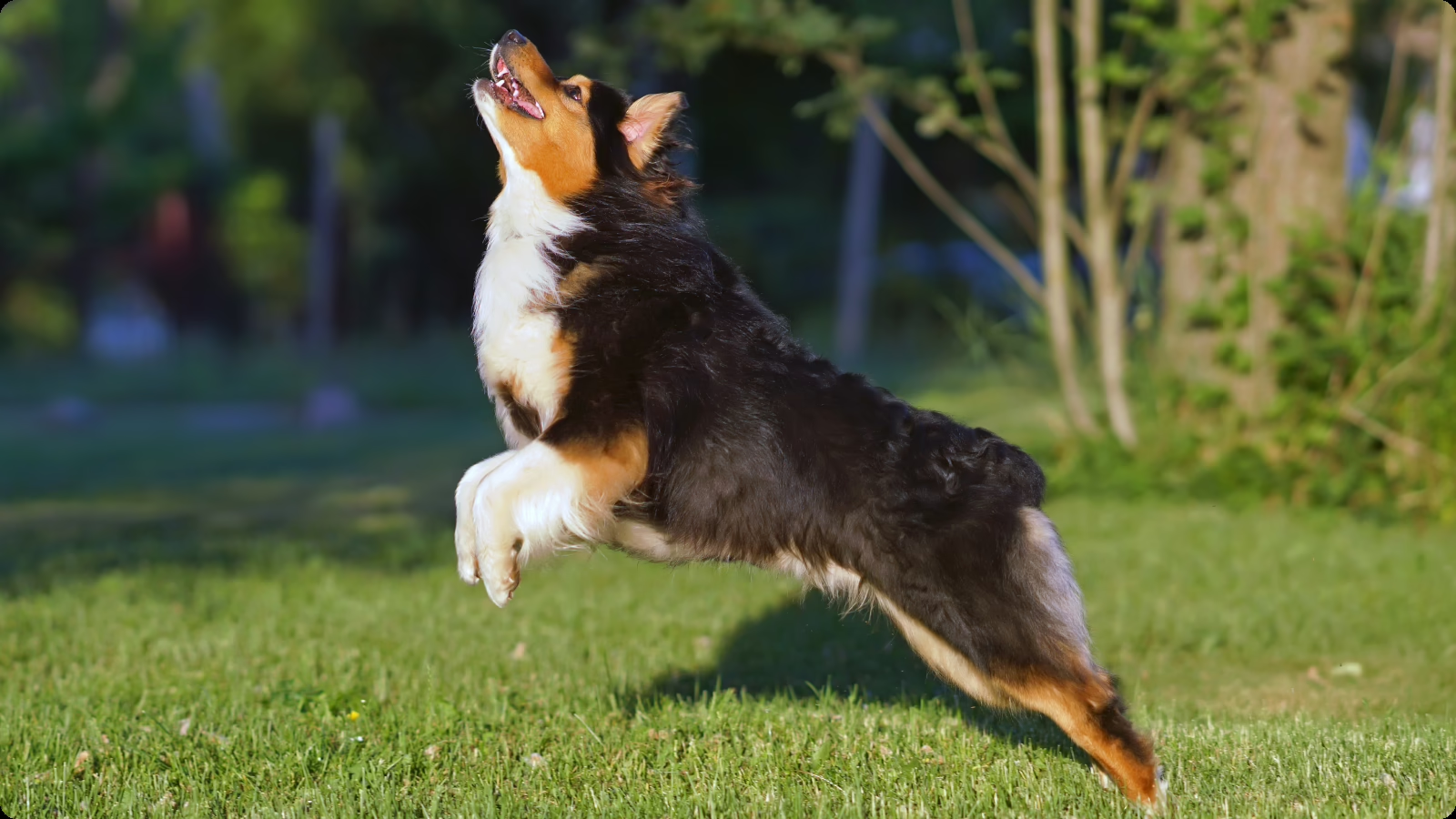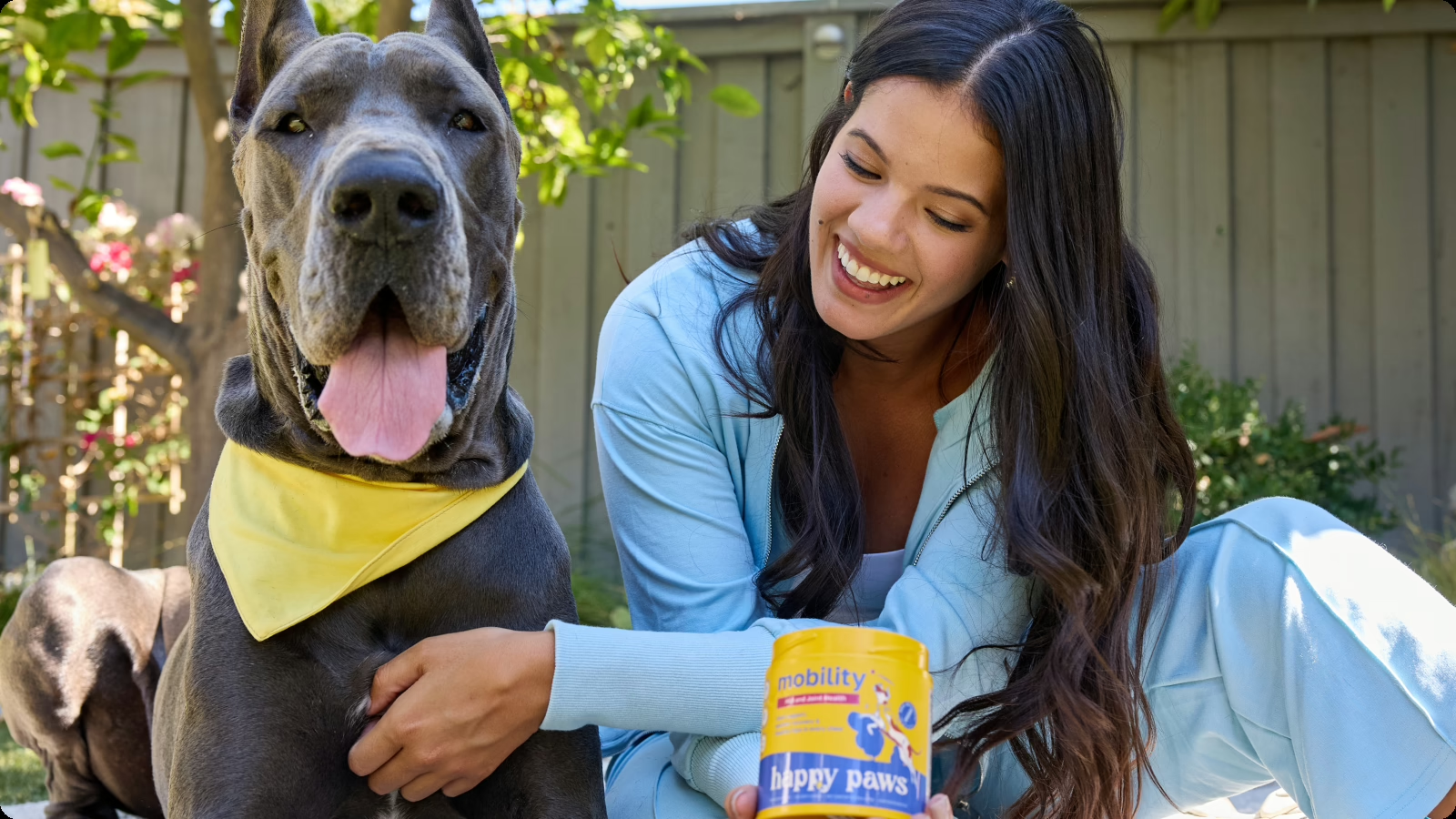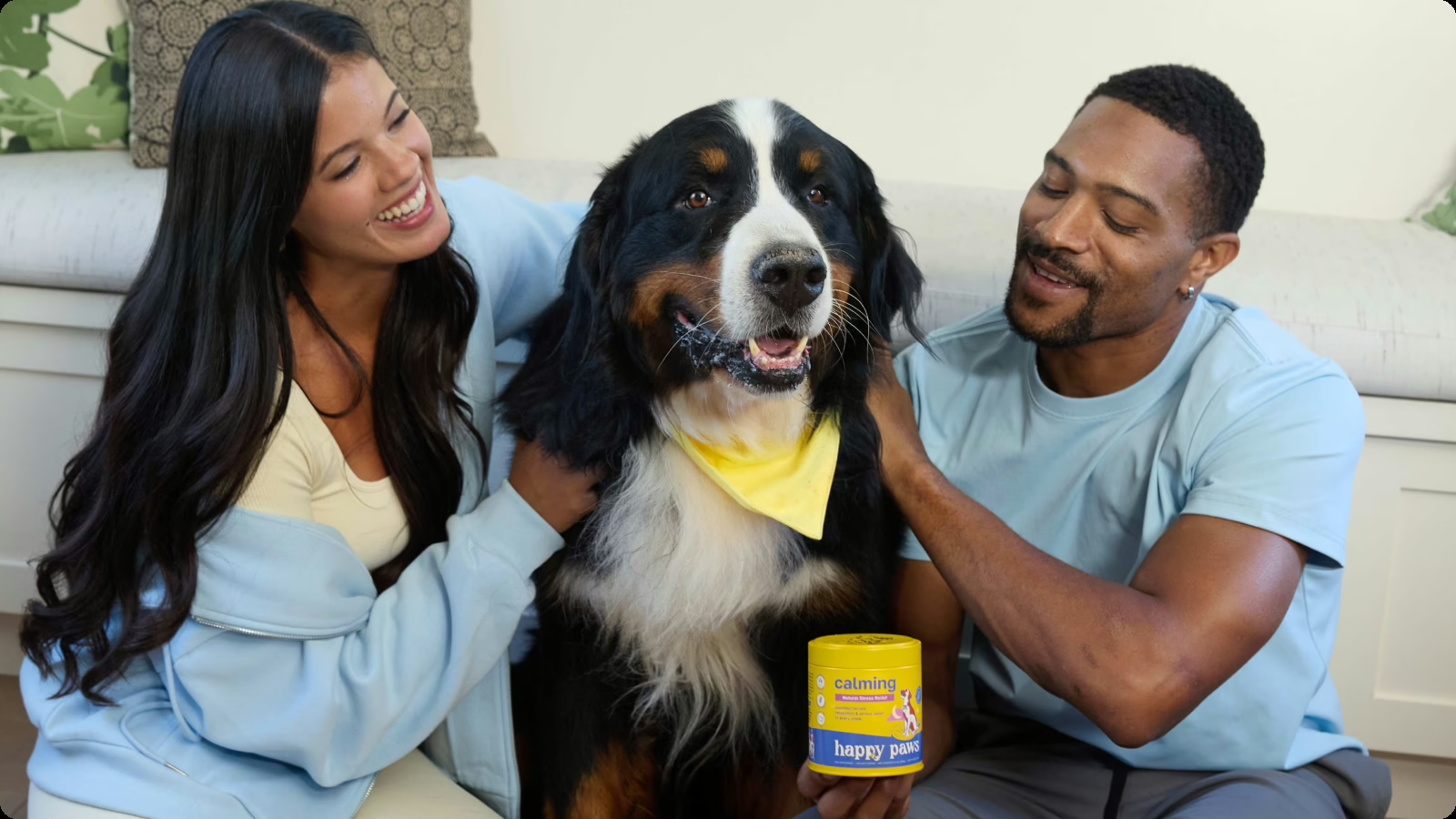The Big Bouncer
Large and in charge, the Bullmastiff is a gentle protector who remains a loyal lap dog well after they surpass a hundred pounds. (Psst … that’s at around nine months old!) Everything about this breed is big. Their paws grow to the size of a catcher’s mitt, their heads become boulder-like, their bodies reach miniature horse proportions, and their hearts, well, those get bigger every day they’re with you—cue the chorale of Bullmastiff howls!
These dogs are more lovers than fighters, but they are protectors, above all. Nothing gets between them and what they love most: you. But don’t worry—this giant is gentle. Their massive frame contrasts with a soft, affectionate personality, and their stoic confidence sheds into a silly goofiness, reserved solely for family.
At Happy Paws, we’re dedicated to helping all dogs, from purebreds to certified mutts, live their happiest, healthiest lives. We’ve designed our dog supplements to target a range of trouble spots in your dog’s health—many of which include common issues for a Bullmastiff.
In this article, we’ll explore the history of this natural protector, provide some information and tips on how to care for them, and help you decide which supplements are best for your family’s bouncer, the Bullmastiff.
Quick Facts
Origin: United Kingdom
Size: Extra large
Breed Group: Working
Lifespan: 7–10 years
Coat: Short hair—minimal grooming recommended
Temperament: Playful, protective, needy & relaxed
Exercise Needs: Despite their size, Bullmastiffs don’t need as much exercise as other extra-large breeds. These dogs can have little bursts of energy throughout the day, making the whole house shake, but they mostly prefer to stay inside on the couch—at least, if that’s where you are.
Training: All dogs need some degree of training, and Bullmastiffs are no different. These dogs need training pretty early on. Training will help your Bullmastiff know the rules of the road and grow into their large, towering frame. Daily training will give your gentle giant guidelines for how to behave around guests, children, elderly folks, and other pets, and early training will help them get their bearings on their quickly growing size.
Dog Health: Like other extra-large breeds, Bullmastiffs have unique health challenges. Common problems this breed faces include hip dysplasia, digestive issues, and cardiovascular complications. We’ll discuss how to address each below.
Happy Paws for Bullmastiffs
Enrich your Bullmastiff’s health with high-quality, tasty supplements like these!
| Type of Happy Paws Supplement | Best for … |
| Cognitive Dog Chews | Promoting brain health & mental clarity |
| Digestive Health Dog Chews | Supporting healthy digestion & a strong gut flora. |
| 10-in-1 Multivitamin Dog Chews | Giving your pupper a daily dose of essential vitamins, minerals & other nutrients. |
| Hip & Joint Dog Chews | Soothing common symptoms of joint dysplasia & inflammation. |
| Probiotic Dog Chews | Restoring the healthy bacteria in your dog’s digestive system. |
In-Depth Look at These Popular Supplements
While Bullmastiffs work hard to be your family’s protective watchdog, they also work just as hard to get a smile on your face. Through goofy little antics or a whimsical side-eye, the Bullmastiff can lighten any room they saunter into. This lovable, loyal breed never lacks compassion and affection for those who know them best.
If you’d like to return the love and spoil your Bullmastiff daily, do so with healthy treats that actually taste like treats. Our high-quality, tail-waggin’ dog supplements use an array of all-natural, organic ingredients to enrich your dog’s physical and mental health, while satisfying their taste buds.
Here are a few dog supplements to help you care for your dog.
Cognitive Dog Chews: Bullmastiffs are intelligent, intuitive dogs, always watching with a curious gaze. Our Cognitive Dog Chews help sharpen their minds well into their golden years. These vegan, chicken-flavored chews use an array of vitamins, minerals, and other nutrients to promote optimal brain health and fight against cognitive decline.
Digestive Health Dog Chews: Our Digestive Health Dog Chews use powerful, all-natural probiotics and enzymes to enrich your dog’s gut health and strengthen their digestive system. These healthy, tasty dog treats offer a delicious pumpkin flavor that spoils your pet’s palate while fortifying their gut flora.
10-in-1 Multivitamin Dog Chews: Our 10-in-1 Multivitamin Dog Chews use multiple essential nutrients to strengthen your dog’s daily health and give them a well-rounded supplement. One vegan, lamb-flavored dog treat introduces ten critical nutrients to keep your dog healthy, happy, and active.
Hip & Joint Dog Chews: Soothe the symptoms of joint dysplasia with our Hip & Joint Dog Chews! Packed with a blend of joint-friendly ingredients, this dog supplement helps reduce inflammation and support joint health, thanks to compounds like glucosamine, chondroitin, and hyaluronic acid.
Probiotic Dog Chews: Made with powerful antioxidants, probiotics, and superfoods, our Probiotic Dog Chews help strengthen your dog’s digestive system, while supporting their gut and bowel health.
Common Bullmastiff Health Concerns
Like other extra large dog breeds, Bullmastiffs are often prone to common health issues like these:
Elbow & Hip Dysplasia: According to the American Kennel Club (AKC), many medium-sized to extra-large dog breeds are susceptible to elbow and hip dysplasia. This issue arises from birth when the bone in a joint is misshapen, causing an awkward fit in your dog’s joints. This defect can often lead to joint pain, osteoarthritis, limping, and trouble standing up.
Digestive Issues: Large to giant breeds commonly have digestive problems, like bloating. These issues can stem from their diet, lifestyle, or genetics.
Cardiovascular Disease: Because of their massive size, Bullmastiffs can be genetically predisposed to cardiovascular problems. So, feeding them a vitamin-rich, nutrient-packed diet is essential to help fortify their heart health.
About the Bullmastiff Breed
In the mid-to-late 19th century, English gatekeepers needed a dog that could chase down and tackle poachers—without causing too much injury. (An injured, would-be poacher could sue for damages!) Other dogs, like Mastiffs, were too slow, and English Bulldogs were a tad too aggressive. So, breeders combined the two to develop a quiet, quick breed that would become a formidable guard dog—the Bullmastiff.
Over time, the Bullmastiff worked hard patrolling country estates and protecting livestock. This gentle giant would spot poachers, hunch down, wade through the rural night, and pin the intruders down—all without making a sound. Their large size helped them subdue the poachers until the gatekeepers arrived.
Today, Bullmastiffs are still used as guard dogs in farming communities worldwide. Their gentle demeanor helps them get along with livestock, while their fierce intelligence builds unshakable trust with farming families. Even if you don’t have a farm or acres of land, Bullmastiffs can squeeze into your family and quickly become an irreplaceable member.
Bullmastiff Temperament
Despite their formidable size, Bullmastiffs are gentle, sensitive dogs. As puppies, they are curious and confident, quickly forming unbreakable bonds with their people. Soon, you’ll have a nearly hundred-pound shadow following your every move. They love kisses, pets, and praise and won’t let their size keep them from being your loyal lap dog.
Early socialization and training can help these dogs find their calm, cool, and confident stride, especially around pets and small children. It’s best to train your Bullmastiff early, as they may accidentally knock down a child, elderly family member, or friend. They were bred to be knock-down specialists, after all.
How to Care for a Bullmastiff
Bullmastiffs are fairly easy dogs to care for if you can handle their size. They are quick learners, so training sticks, and they have short, smooth hair, so shedding isn’t a significant concern. But there are a few tips to help keep your Bullmastiff happy, healthy, and lively from their puppy years and well into their golden years.
Puppy Training
From day one, you are the Bullmastiff’s main motivator. They live and breathe to please you, especially when treats are involved—their second main motivator. With obedience training, growing Bullmastiffs can tap into their working-dog instincts and learn how to maneuver in tight spaces and around small children or the elderly.
Moderate Exercise
Bullmastiffs don’t need much exercise, but a daily walk and involved playtime are still recommended. These dogs like to patrol around your home, ensuring everything is as it was when they did their last round of checks. Because of their size, high-impact workouts may be too much for their joints. So, it’s best to moderate their exercise to easy workouts, like long walks and nature strolls.
Quality Time
Wherever you go, your Bullmastiff is not far behind. Take time during your day to focus on giving your Bullmastiff the love they deserve. You can spend this quality time on the couch, on a walk, or in a game of tug-of-war (they’ll probably go easy on you!). By actively engaging with your Bullmastiff throughout the day, you reinforce their bond with you and validate their affection. Plus, that big ol’ smile is enough to melt away any stress from the day.
Happy Paws: High-Quality Dog Supplements
Keeping your dog happy, healthy, and active shouldn’t feel like a full-time job. At Happy Paws, we’ve designed our dog treats with the best ingredients and flavors possible (our dogs definitely approve!). We’ve made sure these treats are certified organic, non-GMO, and third-party tested for purity, letting you spoil your dog easily with healthy, tasty dog treats.
FAQ
Is Bullmastiff a good family dog?
Because of their natural “protector” instincts, Bullmastiffs can make one of the best family dogs, for the right family. First, these dogs need early training and socialization to teach them proper canine etiquette. A Bullmastiff puppy can get pretty big and has a tendency to jump on strangers, so proper training will help your gentle giant navigate around children and elderly folk. Second, Bullmastiffs need a certain level of space to inhabit. This breed can reach upwards of 150 pounds when fully grown. So, they do best on big lots of land or in medium- to large-sized homes.
What breeds make a Bullmastiff?
The Bullmastiff is a cross between old English Mastiffs and Bulldogs.
Does a Bullmastiff bark a lot?
Properly trained Bullmastiffs don’t bark much, only to alert their owner or deter intruders.
How do you give a Bullmastiff health supplements?
You can give your dog a Happy Paws health supplement in several ways. First, we’ve designed these supplements as dog treats, so you can give them to your pupper as a reward for good behavior. Or, you can add it to your dog’s kibble; they make a pretty tasty topper, too.





